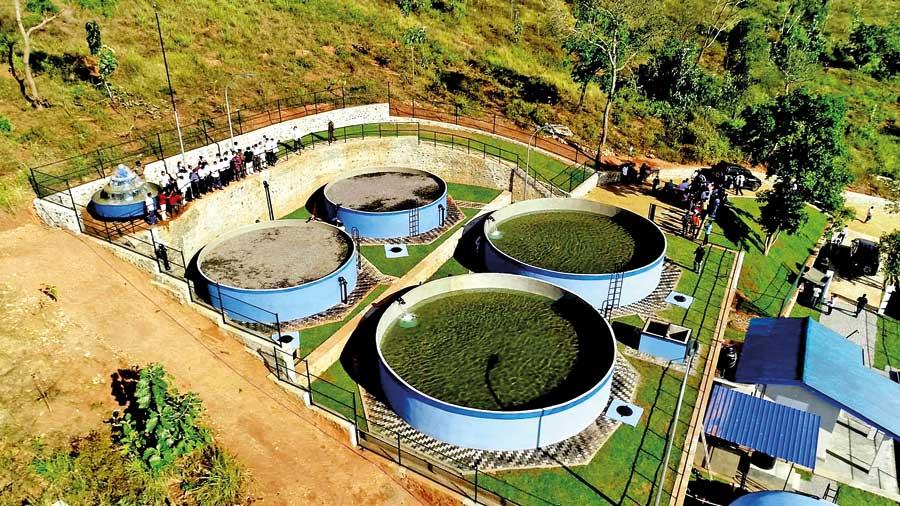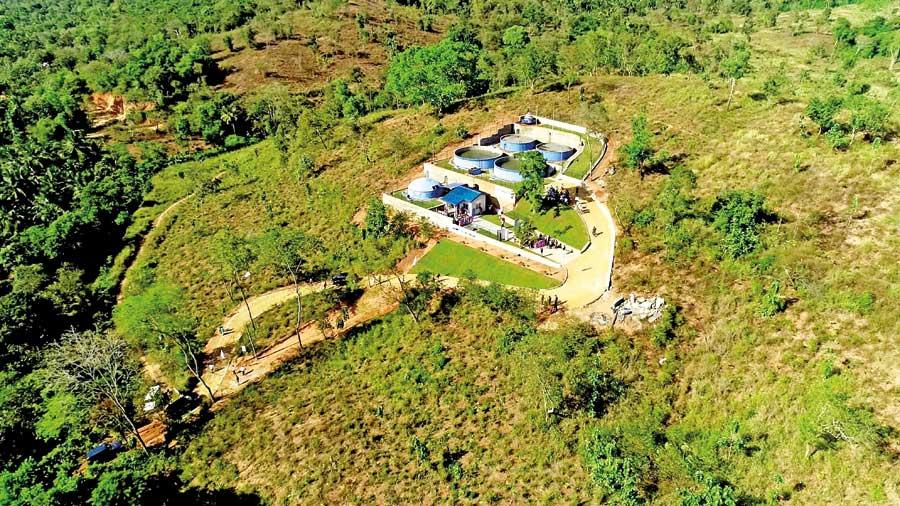07 Apr 2021 - {{hitsCtrl.values.hits}}
Ensuring water security for agricultural productivity, community well-being and resilience

The world over, water is under extreme threat from a growing population, increasing demands of agriculture, and the worsening impacts of climate change. In 2017, 29% of the world’s population did not have access to drinking water that was free from contamination and available on premises when needed, while 11% of the global population lacked even basic drinking water services. Eight out of ten people that lacked access to basic water lived in rural areas.
"In Sri Lanka, only 57.7% of the population has access to pipe borne water"
In Sri Lanka, only 57.7% of the population has access to pipe borne water. Although the remaining population has access to basic water through other methods such as protected dug wells, rainwater harvesting systems and nearby public point sources, access to safe water continues to be a critical issue. Due to the many effects of climate change, Sri Lanka’s Dry Zone, which covers 70% of the country’s land area, has experienced some of the worst droughts in the island’s history, with the 2016 drought continuing for almost two years.
To address this, the United Nations Development Programmme (UNDP) in Sri Lanka together with the Government of Sri Lanka, financed by the Green Climate Fund (GCF), is implementing the ‘Climate Resilient Integrated Water Management Project’ (CRIWMP), in the rain-scarce Dry Zone; which covers Anuradhapura, Polonnaruwa, Puttalam, Kurunegala and Vavuniya. One key aspect of the project’s aims is to improve access to potable water by enhancing community-managed drinking water infrastructure. In this vein of improving access to water, the project handed over Rural Water Supply Schemes and Advanced Filtration Systems to the communities in the Puttalam, Anuradhapura and Vavuniya districts recently.
"Much of Sri Lanka has access to basic water through other methods such as protected dug wells, rainwater harvesting systems and nearby public point sources"
Speaking of the importance of such interventions, Eng. Chandana Edirisooriya, Project Director (CRIWMP) of the Ministry of Irrigation stated,“we must note that nature alone cannot guarantee water security for people in every situation. Both built and natural infrastructure are needed for efficient and effective management of water resources. The project has taken actions to protect, sustainably manage, and restore natural or modified ecosystems, that address societal challenges effectively and adaptively, simultaneously providing human well-being and biodiversity benefits.”
The Rambepitiya Rural Water Supply Scheme was handed over to the public on March 24, 2021, assuring year round access to clean drinking water to more than 400 households in the Dry Zone with the presence of Sanath Nishantha, State Minister of Rural and Divisional Drinking Water Supply Projects Development.The Thalakolawewa Rural Water Supply Scheme related to rural paddy fields was also handed over to the public on March 30, 2021 by Anuradha Jayaratne, State Minister of Tanks, Reservoirs and Irrigation Development which will assure year-round access to water to over 1,512 beneficiaries. Also participating at these events were representatives of the Government of Sri Lanka, UNDP and communities of the area.
"However access to clean water remains a critical issue for a majority of Sri Lankans"
With the Dry Zone being home to a majority of the country’s farmers and smallholders, rural communities are forced to bear the severe impacts of water issues in the country. Ensuring an uninterrupted supply of drinking water during periods of drought; reduced quality of water from public point sources - which scientific speculations have linked to the cause of Chronic Kidney Disease (CKDu) prevalent in some areas in the Dry Zone; limitations in the country’s water production capacity and stress on its water resources; partial treatment and water quality deterioration are some of the crucial issues that affect Sri Lanka.
"Rural water supply schemes and advanced filtration sytems will benefit schools, hospitals, and hundreds of households, ensuring clean water for communities"
Adding on the importance of these water supply schemes to communities, Asoka Ajantha, Project Manager of CRIWMP, UNDP in Sri Lanka stated, “Climate Change is worsening the degradation of our natural resources, especially essential resources like water, and we must work towards saving every drop of clean water and making clean water accessible to all. This timely intervention is life changing for many in the Dry Zone of the country, and UNDP looks towards working together with the Government and stakeholders to intensifying efforts to truly valuing water so all may have equitable access to this most precious resource.”
These Rural Water Supply Schemes and Advanced Filtration Systems will benefit 19 schools, 6 public hospitals and around 500 households, ensuring clean water and sanitation to a host of communities while improving their quality of life.

Thalakolawewa Rural Water Supply Scheme
27 Nov 2024 22 minute ago
27 Nov 2024 25 minute ago
27 Nov 2024 29 minute ago
27 Nov 2024 1 hours ago
27 Nov 2024 3 hours ago